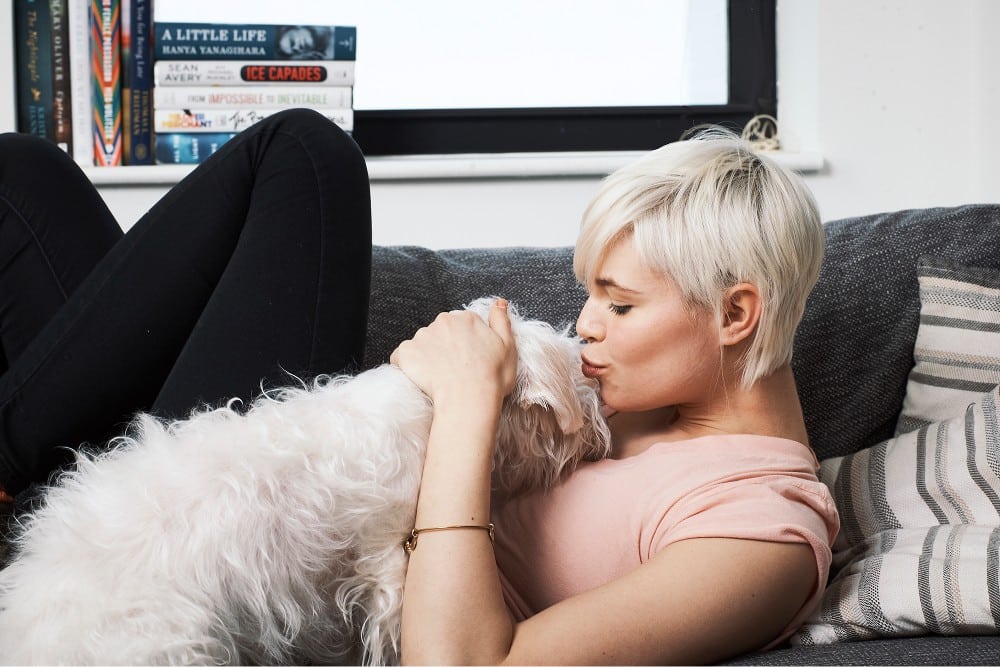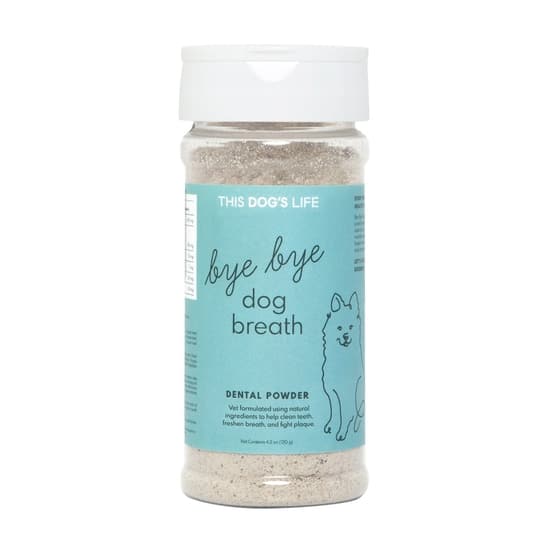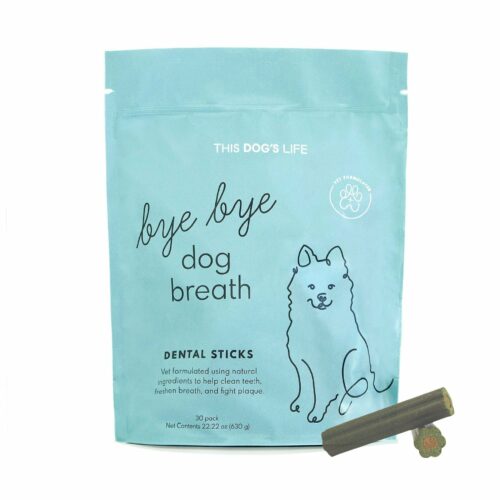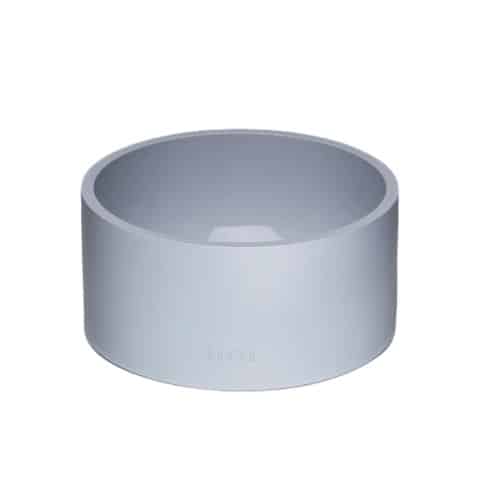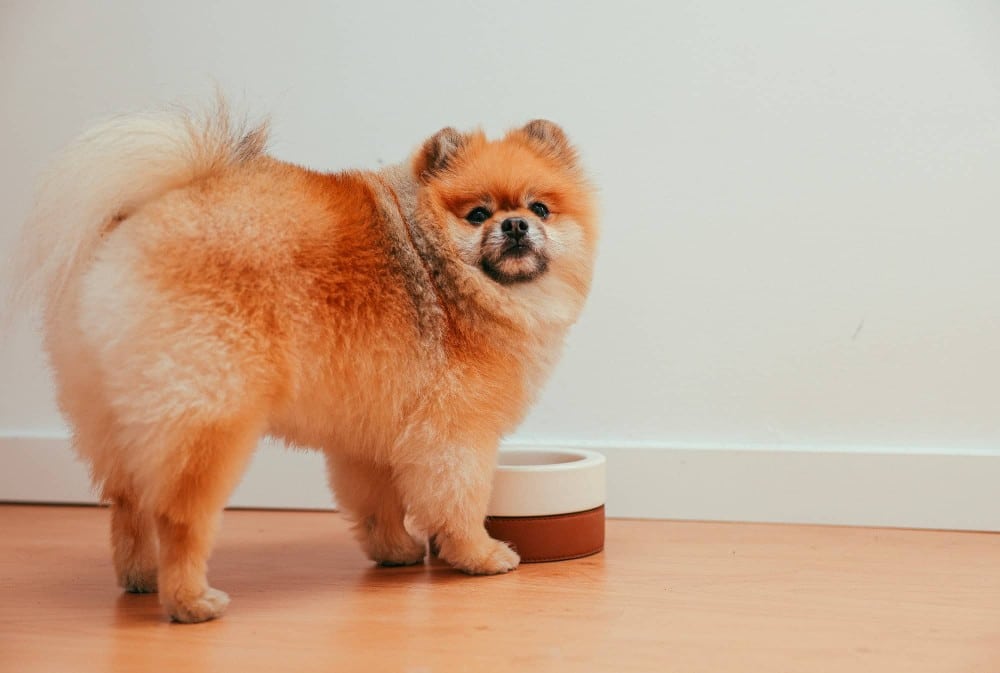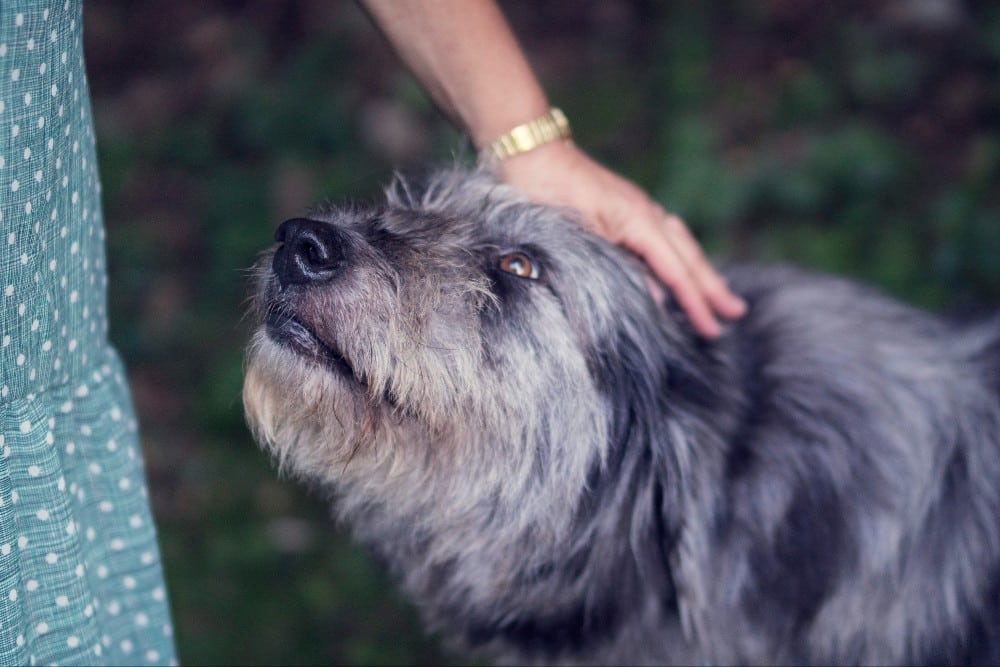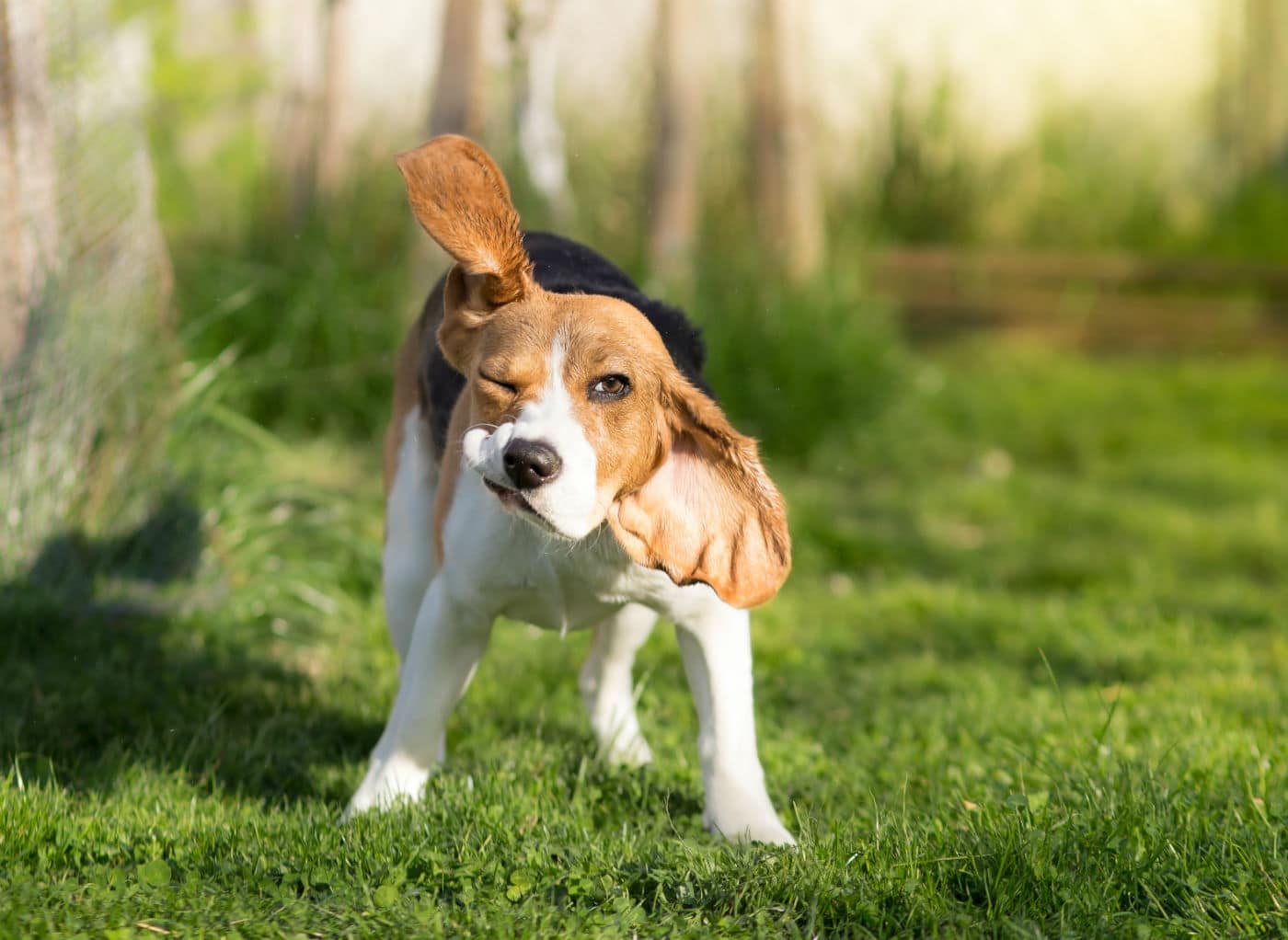We may seem a small commission if you decide to purchase some of the products mentioned. This article has been updated.
They say that dogs’ mouths are cleaner than humans’, but no dog parent who’s ever been on the receiving end of an odiferous kiss from their bad-breathed pooch would ever believe that!
As it turns out, that myth isn’t true — neither species has a particularly clean mouth. On the contrary, both are jam-packed with microbes, some of which we actually share, like the bacteria family called Porphyromonas. Those are the pesky germs responsible for causing gingivitis in both species. And just as this dental issue can lead to tooth decay, tooth loss, and halitosis in humans, it can do the same to dogs.
And while brushing your dog’s teeth is the gold standard, not many of us do it, with less than 4% of dog parents brushing their pup’s teeth every day, according to a survey.
Luckily, there is a fairly wide range of holistic, natural home remedies that can help freshen a dog’s breath — and make those doggy kisses a lot more pleasant!
Let’s take a closer look. (Keep in mind that before incorporating any new foods into your dog’s diet, consult with a veterinarian or professional)
First Things: Get to the Root of Your Dog’s Bad Breath
All canines come down with a case of stank mouth occasionally. Given some of the gross substances that your dog eats, or tries to eat, it’s a wonder the problem isn’t worse. If you feel like fainting every time your dog opens his mouth, however, it could be symptomatic of a more serious issue. And even if it is poor oral hygiene or periodontal disease to blame, you may need to take action.
“Identifying the root cause of the bad breath is an important factor to consider in your dog’s overall health,” says Johnna Devereaux, clinical pet nutritionist, director of nutrition and wellness at Bow Wow Labs and owner of Fetch RI. “An oral exam should be conducted by a veterinarian to ensure there is no gum disease or decaying teeth that may need extraction.”
Other potential reasons for bad breath include kidney disease, poor gut microflora, and a diet that’s less than optimal, so before you give the following natural treatments a try, schedule a check-up with your vet to get the all-clear.
After you are given the all-clear, there are things you can do on a daily basis to not only be proactive and prevent dental issues, but also say goodbye to the nasty breath your dog already has.
- Give Fruits and Veggies as Treats
- Add Probiotics to Your Dog’s Routine
- Grab a Bit of Peppermint and Parsley
- A Dab of Aloe Vera Goes a Long Way
- A Bit of Spirulina Can Do Wonders
- Provide a Steady Supply of Fresh Water
- Add Coconut Oil to Your Dog’s Routine
1. Give Fruits and Veggies to Nosh On — On Occasion
Plenty of dog moms and dads feed their furries apples and carrots, based on the notion that these super-crunchy snacks scrub away plaque on the teeth. It’s true that munching on hard fruits and vegetables can stimulate the production of saliva in the mouth, thereby washing away some of the accumulated bacteria. But Devereaux urges that you err on the side of caution when feeding fruit and vegetables.
“The problem is two-fold,” she explains. First, pet parents are liable to overfeed carrots and apples and rely on them to take care of oral hygiene issues. Secondly, “apples and carrots are both high in starch and fructose, which can feed an underlying issue with yeast that may be present in animals with poor digestive health.”
If you really want to clean out your crisper drawer while cleaning your dog’s teeth, Devereaux suggests celery. “Celery not only promotes saliva but also can have a slight flossing effect on the teeth — and it is low in starch and high in moisture, making it a win-win for the dog.”
Popping them in the freezer also provides a soothing treat for dogs that are teething.
2. Add Some Probiotics to Your Pooch’s Routine
You probably incorporate probiotics into your own diet, noshing on pickles or kimchi or adding yogurt to your daily smoothie. So why not do the same for your canine companion?
In dogs as well as in people, probiotics are beneficial bacteria in the gastrointestinal tract that serve to aid in digestion and keep the immune system humming healthily along. Some of the most common probiotic bacteria strains are Lactobacillus, Bifidobacterium, Streptococcus, and Enterococcus.
You can find probiotic supplements specifically formulated for canine health, including our Bye Bye Dog Breath dental sticks and Bye Bye Dog Breath dental powder, or switch to a dog food that incorporates them.
Packed full of natural ingredients to help keep teeth clean and free of plaque, while supporting gums and freshening breath. With the natural zeolites, the powder acts as a mild abrasive, preventing plaque formation. It also contains beneficial probiotics that helps restore microbial balance in the mouth and remove unhealthy plaque-causing bacteria.
Alternatively, treat your pup to some kefir or yogurt with live cultures to put the “fido” in Bifidobacteria and serve up an effective home remedy for curing your dog’s bad breath by providing good bacteria in the gut.
Related: How the Gut Impacts Your Dog’s Breath — and What to Do About It
3. Grab a Bit of Peppermint and Parsley
After a meal or before a big date, people often turn to peppermint for its breath-freshening properties. It can provide the same benefits for your pooch.
“In its natural state, it can help ease digestive upset and calm the digestive tract, as well as being rich in antioxidants that may be helpful in fighting bad breath,” explains Devereaux.
She also recommends that you choose organic, locally grown mint whenever possible. There are also drops, including Natural Breath Drops for Pets with Chlorophyll & Peppermint Essential Oil, that you give directly to your dog, put on treats or in a water bowl. As it’s an easy herb to grow indoors or out, why not plant some yourself? That way you’ll ensure a steady supply for Rover’s breath – and your mojitos!
Parsley is effective for the same reasons as mint; its fresh flavor deodorizes smelly breath, while its beautiful bright-green hue indicates the presence of chlorophyll, a powerful bacteria-fighting compound that will rid your house of dog bad breath. (Our Bye, Bye Dog Breath Dental Sticks also have parsley and chlorophyll.)
Full of natural ingredients to help keep your dog’s mouth clean by keeping plaque at bay, stopping bad bacteria from wreaking havoc and helping gums stay in tip-top shape.With its targeted and simple system, the DUAL-layered sticks making cleaning a cinch.
Add dried peppermint or parsley directly to your dog’s dinner, or steep either herb to make a tea and incorporate that into the meal. Make sure it is diluted and given in small amounts, as the herbs can be overpowering in smell and taste. Whatever you do, steer clear of peppermint essential oil, which is one of many essential oils that are toxic to dogs.
4. A Dab of Aloe Vera is a Great Oral Cleanser
Do you have an aloe vera plant on your windowsill? If not, it’s time to get one. Aloe vera has anti-inflammatory, antibacterial, and antifungal properties for you and your pets, and it’s easy to use. Simply snip off a tip of the plants’ thick leaves and apply the gel-like substance inside to soothe and heal burns, insect bites, minor cuts, eczema, and even acne. It’s important to note, not to give your dog the whole aloe vera plant leaf, as it contains saponins and glycosides, which can be mildly toxic.
When it comes to dogs, aloe vera gel works well on their skin issues too, including itching and hot spots. Aloe also may also be a good choice for treating the GI-tract troubles that can lead to stinky breath.
“Aloe vera is chock full of enzymes that help cleanse and maintain the digestive system,” says Devereaux. “It also has lots of antiseptic properties, which make it a great oral cleanser.”
Ask your vet to recommend an all-natural product containing aloe vera if you want to use it for digestive issues. For your canine’s canines, apply the gel directly, preferably right before bed, to help loosen plaque.
5. A Bit of Spirulina Can Do Wonders
In the past decade or so, plenty of vegetables, berries, and other plant matter have been lauded as “superfoods.” Some live up to their hype, while others devolve into clickbait-article fodder (“This Woman Lost 75 lbs. By Eating One Weird Food!”). And then there’s spirulina, a superfood that’s stood the test of time.
Related: Why Spirulina Is Considered a Superfood for Dogs
Also known as blue-green algae, spirulina really packs a nutritional punch. It boasts 60 percent protein and has high concentrations of B complex vitamins, vitamin E, vitamin A, essential amino acids and essential fatty acids. Spirulina is also rich in chlorophyll, which has been scientifically shown to be an effective defense against certain microbes.
There are supplements out there along with treats, including our Bye Bye Dog Breath dental sticks, that are chock-full of spirulina. Start with very small amounts of this concentrated cyanobacteria mixed into their food or water to help your pup get the right nutrients to cure them of their bad breath.
6. Provide a Steady Supply of Fresh Water
Speaking of water, did you know that your dog’s water dish is ground zero for bacteria of the harmful variety? It might seem silly to wash and dry the dish before refilling it with fresh water, but that’s exactly what you should do on a daily basis to prevent bacteria from building up. Indeed, a study showed that dog bowls are one of the dirtiest items in a household, containing yeast, mold and coliform bacteria, like Salmonella and E. coli..
If you drink filtered water, you should probably provide it for your animal friends as well. Tap water can be filled with contaminants, while bottled water is an expensive environmental nightmare. Invest in a faucet-mounted filter or a filter pitcher, and don’t forget to change the filters regularly.
Fresh, clean water helps remove bacteria from your dog’s mouth, bits of food, and other particles that may lead to gingivitis and periodontal disease.
A classic bowl with a modern twist, it is made to look ceramic without the concern of breakage. It is extremely durable, and its silicon-grip bottom ensures the bowl won’t slide while your dog is eating or lapping up water. Interior is smooth, so cleaning is a cinch.
7. Adding Coconut Oil to Your Dog’s Everyday Routine
Is there anything that coconut oil can’t do? This versatile substance had a moment in the spotlight a few years back, but even if it’s no longer super trendy, it still provides the same benefits today. Its antiviral, antifungal, and antibacterial properties help fight bad breath. It can also help with better digestion, increased levels of energy, healthier skin, and a softer and shinier coat.
Buy high-quality, organic, virgin, cold-pressed coconut oil if you plan on using this as a home remedy for your dog’s bad breath. For dosing, start out slow, with ¼ tsp. for smaller dogs, 1 tsp. for medium breeds, and 1 tbsp. for the big dogs (but again consult with a veterinarian before you add). Most dogs will eagerly lick it right off the spoon. Feed this amount once or twice each day, but watch your pooch’s weight — this is oil, after all, with a high fat content. You can also incorporate the coconut oil into homemade dog treats or use as a natural toothpaste.
Say Farewell to Foul Dog Breath
Once you’ve ruled out potential medical issues, and maybe stepped up your toothbrushing game, it’s merely a matter of experimentation until you discover a natural remedy that will do the trick. Try these supplements one at a time, so you can really isolate what works to turn your dog’s breath fresh again.
Related: How to Stop Bad Dog Breath
This article is for informational purposes only. It is not, nor is it intended to be, a substitute for professional medical advice, diagnosis, or treatment and should never be relied upon for specific medical advice.













